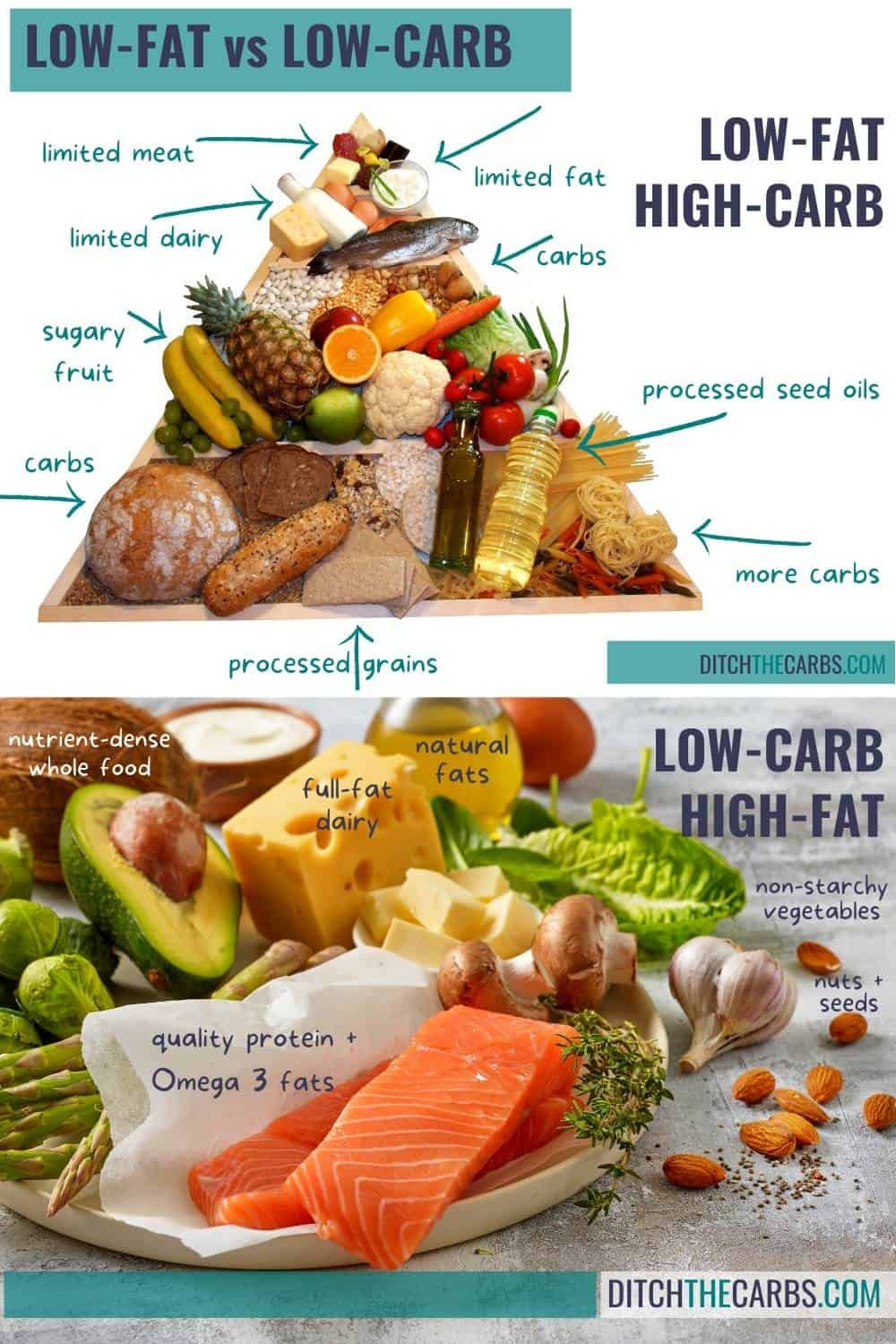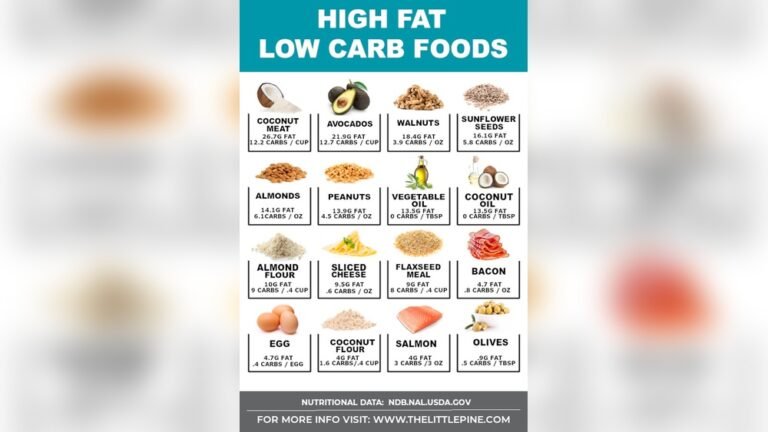Are you searching for foods that help you stay fit without compromising on taste? Choosing low fat, low carb foods can be a game-changer for your health and energy levels.
Whether you want to lose weight, boost your metabolism, or simply feel better every day, the right food choices make all the difference. You’ll discover simple, delicious options that keep both fat and carbs in check—helping you avoid blood sugar spikes and unwanted fat storage.
Ready to find out which foods can fuel your body the best? Keep reading to unlock easy tips and tasty ideas that fit perfectly into your lifestyle.
Benefits Of Low Fat Low Carb Diets
Low fat low carb diets offer many health benefits. They focus on reducing unhealthy fats and sugars. This approach helps the body use energy better. It supports overall wellness and prevents chronic diseases.
Many people choose this diet for its positive effects on weight and health. It is simple to follow with the right food choices. Understanding these benefits can motivate a healthier lifestyle.
Weight Loss Advantages
Low fat low carb diets help burn fat efficiently. They reduce calorie intake naturally by limiting fats and carbs. This diet lowers hunger, making it easier to eat less. The body uses stored fat as energy, promoting weight loss. Many experience steady and lasting weight reduction with this diet.
Improved Blood Sugar Control
This diet stabilizes blood sugar levels by cutting down on sugars and refined carbs. Stable blood sugar prevents energy crashes and mood swings. It lowers insulin spikes, reducing fat storage in the body. People with diabetes often find better control with this diet. Regular blood sugar balance supports better overall health.
Heart Health Benefits
Reducing unhealthy fats and sugars protects the heart. This diet lowers bad cholesterol and raises good cholesterol. It helps reduce blood pressure and inflammation in the body. These changes lower the risk of heart disease and stroke. Eating low fat low carb foods supports a strong, healthy heart.

Credit: thinlicious.com
Foods To Embrace
Choosing the right foods helps maintain a low fat, low carb lifestyle. These foods provide energy without excess calories or sugar. They support weight management and overall health. Focus on nutrient-rich options that satisfy hunger and taste good.
Lean Proteins
Lean proteins build muscle and keep you full longer. Good choices include chicken breast, turkey, and lean cuts of beef. Fish like salmon and cod offer healthy omega-3 fats. Eggs are also a great protein source with few carbs and fat.
Non-starchy Vegetables
Non-starchy vegetables are low in calories and carbs. Spinach, kale, broccoli, and cauliflower add fiber and vitamins. These veggies fill your plate without adding unwanted sugars. They support digestion and help control blood sugar levels.
Healthy Fats
Healthy fats provide energy and support brain health. Olive oil, avocado, and nuts are excellent sources. These fats keep you satisfied and help absorb vitamins. Use them in moderation to avoid extra calories.
Low-sugar Fruits
Low-sugar fruits contain natural sweetness with fewer carbs. Berries, such as strawberries and blueberries, are rich in antioxidants. Apples and pears provide fiber and vitamins. These fruits make a great snack or dessert option.
Whole Grains In Moderation
Whole grains offer fiber and nutrients but contain some carbs. Brown rice, quinoa, and oats are better choices than refined grains. Eating them in small portions supports energy without raising blood sugar too much. Balance is key to a healthy diet.
Foods To Avoid
Choosing low fat and low carb foods helps improve health and manage weight. Avoiding certain foods can make a big difference. Some foods cause blood sugar spikes and fat storage. These foods offer little nutrition and many empty calories. Understanding which foods to avoid supports better choices daily.
Refined Carbohydrates
Refined carbs lose fiber and nutrients during processing. Examples include white rice, pastries, and sugary cereals. They cause blood sugar to rise quickly. This triggers insulin release, encouraging fat storage. Avoid these to keep energy steady and reduce fat gain.
Sugary Drinks And Desserts
Sodas, sweetened juices, and fruit cocktails contain high sugar levels. They add calories without filling you up. Desserts like cakes and candy are loaded with sugar and unhealthy fats. These drinks and sweets lead to quick energy crashes and weight gain.
Processed Snacks
Chips, crackers, and other processed snacks often have unhealthy fats and salt. They usually contain refined carbs and added sugars. These snacks cause cravings and overeating. Choosing whole foods helps control hunger and supports weight loss.
Flavored Yogurts
Flavored yogurts can have as much sugar as candy bars. They often contain added sweeteners and artificial flavors. Plain yogurt is a better option for low fat and low carb diets. It provides protein and probiotics without extra sugar.
White Bread And Pasta
White bread and pasta come from refined grains stripped of fiber. They quickly raise blood sugar and insulin levels. Whole grain versions offer more nutrients and slow digestion. Avoiding white bread and pasta helps maintain steady energy and weight control.

Credit: chomps.com
Meal Planning Tips
Planning meals with low fat and low carb foods can feel tricky. It needs careful choices to keep meals tasty and healthy. Good planning helps you avoid cravings and stay on track.
Here are some simple tips to make meal planning easier and balanced. These ideas help you enjoy your food and meet your diet goals.
Balancing Macronutrients
Include proteins, fats, and carbs in the right amounts. Choose lean meats like chicken or fish for protein. Use healthy fats such as olive oil or nuts. Add low-carb vegetables like spinach and broccoli. This balance keeps energy steady and hunger away.
Incorporating Snacks
Plan small snacks between meals to keep energy up. Pick low-fat, low-carb snacks like Greek yogurt or a handful of almonds. Fresh veggies with hummus are also a good choice. Snacks prevent overeating at main meals and keep you satisfied.
Hydration Strategies
Drink plenty of water throughout the day. Water helps digestion and keeps your body working well. Try herbal teas or water infused with lemon for flavor. Avoid sugary drinks that add hidden carbs and fats. Staying hydrated supports your low fat, low carb plan.
Low Fat Low Carb Snack Ideas
Finding snacks that are both low in fat and carbohydrates can be a smart way to stay healthy. These snacks keep your energy steady without adding extra calories. They satisfy hunger and help control weight. Here are some tasty and simple ideas to try.
Berries And Nuts
Berries are naturally low in carbs and fat. Blueberries, strawberries, and raspberries offer fiber and vitamins. Pair them with a small handful of nuts. Almonds or walnuts add crunch and healthy fats. This combo keeps you full longer and tastes great.
Vegetable Chips
Vegetable chips are a crunchy, low-fat snack. Use kale, zucchini, or beet slices. Bake them with a light sprinkle of salt. They are crispy and full of nutrients. Unlike fried chips, these have fewer carbs and fats.
Greek Yogurt And Eggs
Plain Greek yogurt is low in fat and carbs but high in protein. Add a boiled egg for extra energy. This snack is easy to prepare and keeps hunger away. It also supports muscle health and digestion.
Cheese Options
Choose low-fat cheeses like mozzarella or cottage cheese. They provide protein without many carbs. Cheese snacks are satisfying and quick to eat. Pair with cucumber slices or cherry tomatoes for freshness.
Simple Homemade Snacks
Make your own snacks using basic ingredients. Try cucumber slices with hummus or celery sticks with peanut butter. These options are low in fat and carbs but rich in flavor. Homemade snacks help you control portions and ingredients.
Common Mistakes To Avoid
Choosing low fat low carb foods can boost health and aid weight loss. Many try this diet but make errors that slow progress. Avoiding common mistakes helps reach goals faster and feel better. Understanding these pitfalls guides better food choices and habits.
Overconsuming Processed Foods
Many low fat low carb options come processed and packaged. These often contain hidden sugars and unhealthy additives. Eating too much processed food can add unwanted calories. Natural, whole foods like vegetables and lean meats work best. Always check labels for sugar and unhealthy fats.
Ignoring Portion Sizes
Even healthy low fat low carb foods can cause weight gain if eaten too much. Large portions increase calorie intake without extra nutrition. Use smaller plates and measure servings to control portions. Pay attention to hunger signals to avoid overeating. Balanced portions support steady weight loss.
Neglecting Nutrient Variety
Sticking to a few favorite foods limits important nutrients. Your body needs vitamins, minerals, and fiber from diverse sources. Include leafy greens, nuts, seeds, and lean proteins regularly. Different foods keep meals interesting and nutrition complete. Variety boosts energy and overall health.
Success Stories And Tips
Success stories and practical tips inspire many who choose low fat low carb foods. Real examples show how people achieve their health goals. Learning from others helps you stay on track. Simple advice makes adapting easier and keeps motivation strong.
Real-life Experiences
Many people share their journeys with low fat low carb diets. Some lost weight steadily and felt more energetic. Others improved their blood sugar and heart health. They often mention eating lean meats, fresh vegetables, and healthy fats. Small changes led to big results over time. These stories prove that success is possible for anyone.
Maintaining Motivation
Staying motivated is key for lasting change. Setting clear, small goals helps keep focus. Tracking progress with a journal or app shows improvements. Celebrating non-scale victories like better sleep or mood helps too. Finding support from friends or groups makes the journey easier. Remember to be patient and kind to yourself.
Adapting To Lifestyle Changes
Switching to low fat low carb foods means changing habits. Meal planning saves time and reduces stress. Trying new recipes keeps meals interesting. Eating out requires smart choices like grilled meats and salads. Adjust portions and snacks to suit your hunger. Flexibility helps you enjoy the diet without feeling restricted.

Credit: www.healthline.com
Conclusion
Choosing low fat low carb foods supports healthy eating habits and weight control. Focus on fresh vegetables, lean proteins, and healthy oils. Avoid processed foods with added sugars and refined grains. Eating balanced meals helps maintain energy and reduces belly fat.
Small changes in diet make a big difference over time. Keep meals simple and natural for better health. Consistent choices lead to lasting results and improved well-being.


